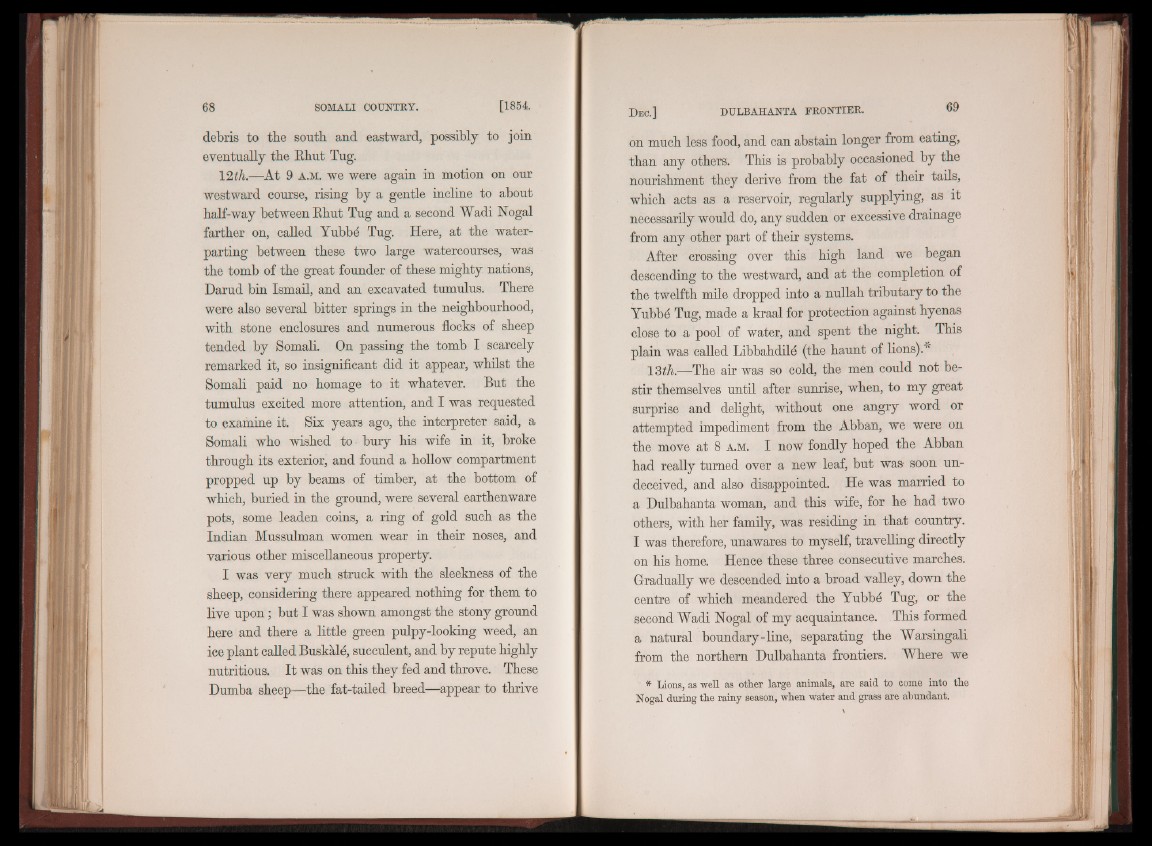
debris to the south and eastward, possibly to join
eventually the Ehut Tug.
12th.—At 9 a.m. we were again in motion on our
westward course, rising by a gentle incline to about
half-way between Ehut Tug and a second Wadi Nogal
farther on, called Yubbd Tug. Here, at the water-
parting between these two large watercourses, was
the tomb of the great founder of these mighty nations,
Darud bin Ismail, and an excavated tumulus. There
were also several bitter springs in the neighbourhood,
with stone enclosures and numerous flocks of sheep
tended by Somali. On passing the tomb I scarcely
remarked it, so insignificant did it appear, whilst the
Somali paid no homage to it whatever. But the
tumulus excited more attention, and I was requested
to examine it. Six years ago, the interpreter said, a
Somali who wished to bury his wife in it, broke
through its exterior, and found a hollow compartment
propped up by beams of timber, at the bottom of
which, buried in the ground, were several earthenware
pots, some leaden coins, a ring of gold such as the
Indian Mussulman women wear in their noses, and
various other miscellaneous property.
I was very much struck with the sleekness of the
sheep, considering there appeared nothing for them to
Eve upon; but I was shown amongst the stony ground
here and there a little green pulpy-looking weed, an
ice plant called Buskald, succulent, and by repute highly
nutritious. I t was on this they fed and throve. These
Dumba sheep—the fat-tailed breed—appear to thrive
on much less food, and can abstain longer from eating,
than any others. This is probably occasioned by the
nourishment they derive from the fat of their tails,
which acts as a reservoir, regularly supplying, as it
necessarily would do, any sudden or excessive drainage
from any other part of their systems.
After crossing over this high land we began
descending to the westward, and at the completion of
the twelfth mile dropped into a nullah tributary to the
Yubbii Tug, made a kraal for protection against hyenas
close to a pool of water, and spent the night. This
plain was caUed Libbahdild (the haunt of lions).*
13 th.—The air was so cold, the men could not bestir
themselves until after sunrise, when, to my great
surprise and delight, without one angry word or
attempted impediment from the Abban, we were on
the move at 8 a.m. I now fondly hoped the Abban
had really turned over a new leaf, but was soon undeceived,
and also disappointed. He was married to
a Dulbahanta woman, and this wife, for he had two
others, with her family, was residing in that country.
I was therefore, unawares to myself, travelling directly
on his home. Hence these three consecutive marches.
GraduaUy we descended into a broad valley, down the
centre of which meandered the Yubbd Tug, or the
second Wadi Nogal of my acquaintance. This formed
a natural boundary-line, separating the Warsingali
from the northern Dulbahanta frontiers. Where we
* Lions, as well as other large animals, are said to come into the
Nogal during the rainy season, when water and grass are abundant.